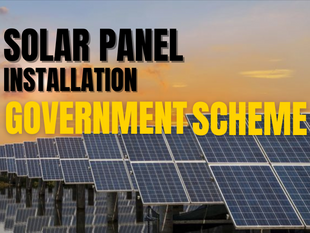
Solar Panel Installer: Your Ultimate Guide to Choosing the Right Expert in 2025
May 7, 2025
4 min read
0
33
0
The shift to renewable energy is more affordable than ever before in 2025, with solar energy taking center stage. With homeowners and companies looking for sustainable energy alternatives, the need for expert solar panel installers has grown. Choosing the right expert is vital to guarantee effective installation, maximum system performance, and long-term cost savings.
Why Choose Solar Energy?

Before delving into the selection process, it's essential to understand the benefits of solar energy:
Cost Savings: Solar panels can significantly reduce electricity bills over time.
Environmental Impact: Utilizing solar power reduces reliance on fossil fuels, decreasing greenhouse gas emissions.
Energy Independence: Solar systems provide autonomy from grid power, offering reliability during outages.
Increased Property Value: Homes equipped with solar installations often see a rise in market value.
With all these benefits, it's not surprising that more people are looking for a solar panel installer near me.
How to Select the Best Solar Panel Installer
Choosing a good installer entails some things to consider:
1. Experience and Expertise
Choose installers with an established track record in the industry. Seasoned professionals are most likely to deliver quality installations and see around corners when challenges are expected.
2. Certifications and Licenses
Ensure the installer is certified, i.e., the NABCEP (North American Board of Certified Energy Practitioners) certification. This reflects a high standard of professionalism and conformance to industry standards.
3. Customer Reviews and Testimonials
Check customer reviews to determine how reliable the installer is and the quality of services. Google Reviews and Yelp can be good sources of information.
4. Warranty and Maintenance Services
A good installer should provide warranties on equipment and labor. Also, ask about maintenance services to maintain the life of your solar system.
5. Clear Pricing
Get detailed quotes that specify all the costs involved, such as installation, equipment, permits, and any other fees. Clear pricing prevents surprise costs.
Critical Tools and Equipment for Solar Panel Installation
A successful solar panel installation is not just about quality panels and inverters; it needs the right tools to provide safety, efficiency, and accuracy. The following is an overview of the critical tools and equipment used by professional installers:
1. Mounting Hardware
Roof Mounts and Racking Systems: These are essential for mounting solar panels onto the roof. They are available in different designs, such as rail-based and ballasted systems, which are adapted to suit various roof types and configurations.
2. Electrical Tools
Wire Strippers and Crimpers: For stripping and crimping wires to secure them.
Multimeters: Used for testing electrical circuits and ensuring correct connections.
Torque Wrenches: To ensure all bolts are tightened to the required specifications, avoiding damage or inefficiency.
3. Protective Gear
Personal Protective Equipment (PPE): Helmets, gloves, and harnesses that protect installers from potential injury.
Insulated Tools: Electrical shock protection while installing.
4. Lifting Equipment
Ladders and Scaffolding: Safe access to rooftops.
Hoists or Cranes: For lifting heavy panels to elevated heights.
Travelers Insurance
5. Solar-Specific Tools
Panel Lifting Bags: Allow for the safe handling and placement of solar panels.
Solar Panel Cleaning Kits: Keep panels free from debris, ensuring maximum efficiency.
The Solar Panel Installation Process
Knowing the installation process can help manage expectations and make the process smooth:
Initial Consultation: The installer determines the suitability of your property to the solar panels, taking into consideration the orientation of your roof and the amount of shading.
System Design: Based on your energy requirements and property details, a tailored solar system is designed.
Permitting: Permits are acquired from local authorities to ensure conformity with regulations.
Installation: Solar panels and equipment are installed by professionals.
Inspection and Activation: After installation, inspections are carried out to ensure all the parts operate as they should before the system is energized.
Trends in Solar Panel Installation in 2025
The solar market keeps changing, with a number of trends defining the scene:
Smart Home Integration: Solar systems are being coupled with smart home appliances for better energy management.
Battery Storage Units: Homeowners are investing in battery storage units to store energy during sunny days for use on cloudy days.
Government Incentives: Governments are offering various incentives and rebates to cut down the initial cost of solar installations.
Sustainable Practices: Installers are embracing environmentally friendly practices, including recycling outdated panels and employing sustainable materials.
Frequently Asked Questions Regarding Solar Panel Installation
Q: How much does it cost to install solar panels?
Cost depends on system size, equipment quality, and installation difficulty. Residential installations take an average of ₹3,00,000 to ₹6,00,000 in India.
Q: How long is the installation process?
Installation is usually between 1 and 3 days, depending on system size and site conditions.
Q: What kind of maintenance is needed?
Annual checks and regular cleaning are advised to keep the system running efficiently.
Q: Is there any financing available?
Financing options are available from many installers, and government initiatives can offer further assistance.
Conclusion
Solar energy investment is a progressive move that provides long-term advantages. By choosing a qualified solar panel installer locally, you can have a hassle-free installation process and reap the benefits of renewable energy.





